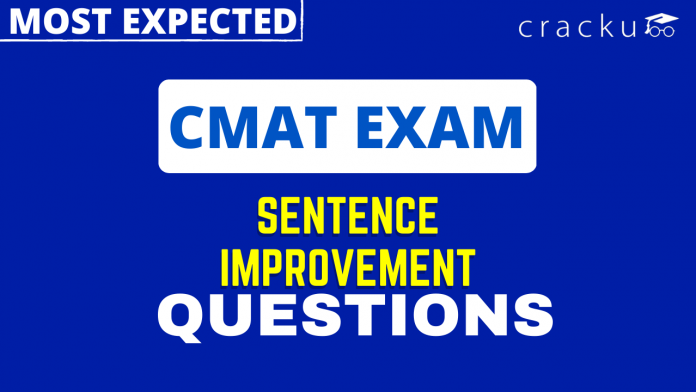CMAT Sentence Improvement Questions [Important PDF]
Download CMAT Sentence Improvement questions with solutions PDF by Cracku. Practice CMAT solved Sentence Improvement Questions paper tests, which are the practice question to have a firm grasp on the Sentence Improvement topic in the CMAT exam. Top 20 very Important Sentence Improvement Questions for CMAT based on the questions asked in previous exam papers. Click on the link below to download the Sentence Improvement Questions for CMAT PDF with detailed solutions.
Download Sentence Improvement Questions for CMAT
Enroll to CMAT 2023 Crash Course
Question 1: In the sentence identify the segment which contains the grammatical error.
She behaves in a such a cordial manner that everyone admires her
a) admires her
b) that everyone
c) She behaves in a
d) such a cordial manner
1) Answer (C)
Solution:
The grammatically correct sentence of the given sentence is – ‘She behaves in such a cordial manner that everyone admires her.’ So, the error part is option c, i.e, “She behaves in a”, which must be replaced by ‘ she behaves in’.
Instructions
In the following question, some part of the sentence may have errors. Find out which part of the sentence has an error and select the appropriate
option. If a sentence is free from error, select ‘No Error’.
Question 2: I can give you the unique and (a:/ quality content that will definitely (b:/ lead value to your readers too. (c:/ No Error (d:
a) 1
b) 2
c) 3
d) 4
2) Answer (A)
Solution:
I can give you the unique and quality content that will definitely lead value to your readers too.
Question 3: He is reputed to be a closedfisted man
a) claw fisted
b) clasped fisted
c) close fisted
d) no improvement
3) Answer (C)
Solution:
He is reputed to be a close-fisted man would be a correct sentence.
Hence, option C is the correct answer.
Question 4: In the given question, a part of the sentence is underlined. Below are given alternatives to the underlined part at A,B and C which may improve the sentence. Choose the correct alternative. In case no improvement is needed, your answer is D
To contact the police he tried hard
a) He tried to contact the police hard
b) He tried hard to contact the police
c) He tried the police to contact hard
d) No improvement
4) Answer (B)
Solution:
“He tried hard to contact the police” is the correct sentence.
Hence, option B is the correct answer.
Question 5: In question some parts of the sentences have errors and some are correct. Find out which part of a sentence has an error and blacken the oval corresponding to the appropriate letter A,B,C. If a sentence is free from error. Blacken the oval corresponding to D in the answer sheet
a) The number of guests
b) invited to the wedding
c) are one thousand
d) no error.
5) Answer (C)
Solution:
The correct answer is “The number of guests invited to the weddings is one thousand”.
Instructions
In the following question, some part of the sentence may have errors. Find out which part of the sentence has an error and select the appropriate option. If a sentence is free from error, select ‘No Error’.
Question 6: Elderly people can have a normal (1)/ body temperature below 98.6-degrees so (2)/ the younger population can have a little higher temperature. (3)/ No Error (4)
a) Elderly people can have a normal
b) body temperature below 98.6-degrees so
c) the younger population can have a little higher temperature.
d) No Error
6) Answer (B)
Solution:
In part (2) of the sentence, replace ”so” with ”but” so as to make the sentence grammatically and contextually correct.
Question 7: A sentence/a part of the sentence is underlined. Four alternatives are given to the underlined part which will improve the sentence. Choose the correct alternative and click the button corresponding to it. In case no improvement is needed, click the button corresponding to “No improvement”.
An old friend, may I give you an advice?
a) give you some advice
b) give you an advise
c) offer you an advice
d) No improvement
7) Answer (A)
Solution:
Advice is not countable. Not “an advice” but “advice” or ” some advice”.
The word advice is an uncountable noun. Uncountable nouns do not have plural forms. They cannot be used with the articles a/an.
He gave me some advice. (NOT He gave me an advice.) (NOT He gave me advices.)
Incorrect: Let me give you an advice.
Correct: Let me give you some advice.
Incorrect: She was always there to give great advices.
Correct: She was always there to give great advice.
Hence option A
Question 8: A sentence/a part of the sentence is underlined. Four alternatives are given to the underlined part which will improve the sentence. Choose the correct alternative and click the button corresponding to it. In case no improvement is needed, click the button corresponding to “No improvement”.
I’m staying with some friends who are owning a farm.
a) will be owning
b) own
c) have been owning
d) No improvement
8) Answer (B)
Solution:
“are owning” a farm is grammatically incorrect. Present Continuous is not required here. “Own a farm” is enough and makes perfect sense.
Hence answer is B
Question 9: A sentence/a part of the sentence is underlined. Four alternatives are given to the underlined part which will improve the sentence. Choose the correct alternative and click the button corresponding to it. In case no improvement is needed, click the button corresponding to “No improvement”.
Do you know the time when the train departs?
a) which
b) by
c) that
d) No improvement
9) Answer (D)
Solution:
No improvement required as sentence is perfectly correct. No need for alteration.
Hence D
Question 10: A sentence/a part of the sentence is underlined. Four alternatives are given to the underlined part which will improve the sentence. Choose the correct alternative and click the button corresponding to it. In case no improvement is needed, click the button corresponding to “No improvement”.
His argument against his opponent duly brought jeers from the crowd.
a) invective
b) praise
c) controversy
d) No improvement
10) Answer (A)
Solution:
Only word closes in meaning to argument is “invective”
Rest all words dont come close
Invective generally means insulting, abusive, or highly critical language.
Example
“he let out a stream of invective”
Hence option A
Question 11: A sentence/a part of the sentence is underlined. Four alternatives are given to the underlined part which will improve the sentence. Choose the correct alternative and click the button corresponding to it. In case no improvement is needed, click the button corresponding to “No improvement”.
He likes to drive his car at a speed of eighty kilometres each hour.
a) every hour
b) an hour
c) hourly
d) No improvement
11) Answer (B)
Solution:
“Each hour” is technically wrong.
“An hour” is correct version and correct article usage.
Hence B is wrong
Question 12: In the following questions, one part of the sentence may have an error. Find out which part of the sentence has an error and click the button corresponding to it. If the sentence is free from error, click the “No error” option.
a) (a) She enquired from the stranger
b) (b) who was he and
c) (c) what he wanted from her.
d) (d) No Error
12) Answer (B)
Solution:
“Who was he” is incorrect because of structural deficiency in making proper grammatical sense. Hence B
“Who he was ” is the correct version
Question 13: In the following questions, one part of the sentence may have an error. Find out which part of the sentence has an error and click the button corresponding to it. If the sentence is free from error, click the “No error” option.
The General Manager of the industry has felt (A)/ that there is no use of (B)/ discussing about the problems with the labourers. (C)/No Error (D
a) A
b) B
c) C
d) D
13) Answer (C)
Solution:
“Discussing about” is wrong. Omit “about” to make it true.
Hence C
Question 14: In the following questions, one part of the sentence may have an error. Find out which part of the sentence has an error and click the button corresponding to it. If the sentence is free from error, click the “No error” option.
Could she cite (A)/ any precedent in support (B)/ for her case? (C)/ No Error(D)
a) A
b) B
c) C
d) D
14) Answer (C)
Solution:
‘for her case’ is wrong. It is preposition related error.
Hence the correct answer is C
Question 15: A sentence/a part of the sentence is underlined. Four alternatives are given to the underlined part which will improve the sentence. Choose the correct alternative and click the button corresponding to it. In case no improvement is needed, click the button corresponding to “No improvement”.
He was so much a coward to help his friend.
a) so much cowardly
b) too much of a coward
c) as coward
d) No improvement
15) Answer (B)
Solution:
The phrase ” so much ” in connection to the extent of cowardice is unwarranted.
” too much of a coward ” is the correct connotation and hence the answer is B
Question 16: A sentence/a part of the sentence is underlined. Four alternatives are given to the underlined part which will improve the sentence. Choose the correct alternative and click the button corresponding to it. In case no improvement is needed, click the button corresponding to “No improvement”.
No sooner did the teacher come into the class when we stood up.
a) since
b) then
c) than
d) No improvement
16) Answer (C)
Solution:
The combination of “did” with the “bare infinitive” is sometimes called an “emphatic” tense, and so the first sentence might be more “emphatic,” calling attention to the fact that the teacher really entered the room.
The expression ‘no sooner…than’ is used to suggest that one action or situation takes place/took place immediately after another action or situation.
When ‘no sooner’ goes at the beginning of the sentence, we use an inverted word order. That means the auxiliary verb goes before the subject.
Hence option C
Question 17: A sentence/a part of the sentence is underlined. Four alternatives are given to the underlined part which will improve the sentence. Choose the correct alternative and click the button corresponding to it. In case no improvement is needed, click the button corresponding to “No improvement”.
Though he worked hard, but he failed.
a) and
b) yet
c) then
d) No improvement
17) Answer (B)
Solution:
Use of “but” here is wrong cause Though is followed by ‘yet’. When though / although / even though is used with a verb, which is in the subjunctive mood, mainly expressing doubt, a condition contrary to a fact, a wish, or a concession, it should be followed by yet. Yet actually means still.
Hence B
Question 18: A sentence/a part of the sentence is underlined. Four alternatives are given to the underlined part which will improve the sentence. Choose the correct alternative and click the button corresponding to it. In case no improvement is needed, click the button corresponding to “No improvement”.I did not give at the examination as my circumstances are bad.
a) write
b) sit
c) appear
d) No improvement
18) Answer (C)
Solution:
“Give” is actually making the sentence structurally incorrect.
We use “appear” in the context of the exam. Other options are irrelevant.
Hence answer is C
Question 19: A sentence/a part of the sentence is underlined. Four alternatives are given to the underlined part which will improve the sentence. Choose the correct alternative and click the button corresponding to it. In case no improvement is needed, click the button corresponding to “No improvement”.You have come here with the intention in insulting me.
a) for insulting me
b) of insulting me
c) on insulting me
d) No improvement
19) Answer (B)
Solution:
“of insulting me” because it is correct phrase. preposition ‘of’ is appropriate in the given context of the sentence. Hence the answer is B
Question 20: A sentence/a part of the sentence is underlined. Four alternatives are given to the underlined part which will improve the sentence. Choose the correct alternative and click the button corresponding to it. In case no improvement is needed, click the button corresponding to “No improvement”.
There was little he could do to save his battered reputation
a) salvage
b) wreck
c) destroy
d) No improvement
20) Answer (A)
Solution:
‘Salvage’ is the most appropriate word in the given sentence in place of ‘save’. ‘Salvage’ means to recover.





